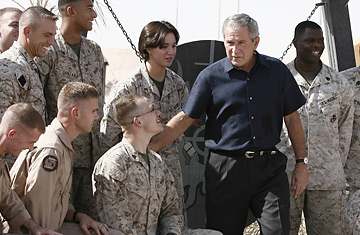
US President George W. Bush (L) greets troops at Al-Asad Air Base in Anbar Province, Iraq.
President Bush made a surprise visit to Iraq on Monday, leaving the White House secretly Sunday evening to fly to Al Asad airbase, in Anbar province, for meetings with U.S. military commanders, Iraqi leaders and some of the approximately 10,000 American troops stationed there. The trip kicks off a pivotal week for Bush, as Washington girds for a series of progress reports from U.S. Ambassador Ryan Crocker and Gen. David Petraeus on Sept. 10 and 11 that may determine how many U.S. troops will stay in Iraq — and how long they will stay there.
Aides billed the six-hour stop as a fact-finding mission for the President, saying Bush wanted to see for himself what was happening in Iraq, since it will be his responsibility to make the final call about troop levels. "This gives the president an opportunity first hand to hear from people directly involved and make his own assessments at the same time," said National Security Advisor Stephen Hadley on board Air Force One Sunday night.
After speaking with with Petraeus and Crocker, Bush struck an optimistic note, saying that they had told him troop levels could come down in Iraq if stabilization continued at the current pace. But speaking to an ebullient crowd of service men and women Bush said, "When we begin to draw down troops in Iraq it will be from a position of strength and success, not from a position of fear and failure."
The President planned to meet with local leaders and members of the central government in Baghdad, in hopes of encouraging wider cooperation between the distrustful factions. The central government, dominated by Shiites like Prime Minister Nouri al-Maliki, is wary of the Sunni-led militias of Anbar province. Hadley said one of the purposes of the trip was to get the Anbar militias incorporated into the central government's power structure.
Bush can expect a warm welcome at Al Asad. U.S. troop morale in Anbar province is high thanks to Marine and Army victories over al Qaeda during the past year. Bush also has some momentum behind him following a month of Iraq visits by members of Congress, in which an almost universally negative outlook was replaced by a more optimistic view, even among some Democrats. Still, polls show that 70% of Americans disapprove of the President's handling of the war; aides hope that his personal presence in the region — even on Labor Day, when news is far from most Americans' minds — may act as a catalyst to shift perceptions.
The surprise trip was planned over a six week period by a small group at the White House, convened by chief of staff Josh Bolten and including Hadley, vice president Dick Cheney and a handful of other top aides. Hadley said that when the President was approached about the idea of a trip to Anbar province he leapt at it.
Bush had a long-planned trip to the Asia Pacific Economic Cooperation summit in Sydney, and moved his departure up a day to make the Iraq stop. Journalists expecting to travel on Air Force One to Sydney were contacted in secret Saturday afternoon, told that a trip to Iraq was to take place the next day and were asked to tell no one except a single editor and their spouse. Bush left the White House by car (rather than helicopter) Sunday after 7 p.m. without a motorcade. At Andrews Air Force Base he boarded Air Force One in its hangar and the plane only rolled out for take off after dark.
